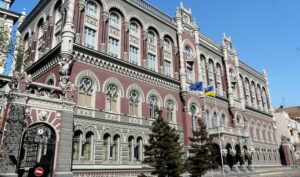
Guided by the legal requirements and taking into account the proposal of the Deposit Guarantee Fund (FGVFL), the National Bank of Ukraine adopted its decision #90 of March 7 to withdraw the banking license and liquidate JSC Bank Forward starting March 8, 2023.
In a Wednesday press release, the NBU reminded that its board had decided on Feb. 7 to categorize Forward Bank as insolvent due to its failure to bring its activities into compliance with Ukrainian legislation, including the regulations of the National Bank, after categorizing it as a problem bank.
From March, 1 FGVFL started paying out the guaranteed compensations to the depositors of the bank “Forward” according to the contracts, which term expired till February, 7, 2023 and the contracts of bank settlement. The first part of the general register of depositors includes information on more than 48 thousand accounts with a total guaranteed amount of almost 326 million UAH.
The ultimate beneficial owner of the bank is Russian citizen Rustam Tariko. The Decree of the President of Ukraine in October 2022 enacted a decision of the National Security and Defence Council of Ukraine, which imposed personal sanctions on Tariko.
According to the NBU, as of January 1, 2023, the bank ranked 46th by assets (UAH 2.36 billion) out of 67 then-existing banks.

Net sales of dollars by the National Bank of Ukraine (NBU) increased to $714.9 million in the third week after falling slightly in the second week of the new year to $652.5 million from $674.7 million in the first.
According to the National Bank on its website, it bought $7.5 million from January 16 to 20, the same as usual buying volumes during the war, while it sold $722.4 million, up from $659.0 million a week earlier.
On the cash market, the dollar depreciated by about UAH 0.15 during the week to about UAH 40.35/$1, while the spread remained narrow.
As we informed, the volume of interventions of the National Bank in December increased to $3.16 billion from $1.57 billion in November and $2.03 billion in October.
International reserves of the National Bank in December increased by 1.9%, or $536.4 million to $28.491 billion due to currency receipts from international partners, which exceeded the NBU interventions to sell currency to support a fixed rate. For 2022, they decreased by 7.9%, or $2.45 bln.
Last year, the NBU bought $3 bln 268.0 mln and EUR111.0 mln on the market, and sold $26 bln 380.6 mln and EUR1 bln 789.1 mln.

Net sales of dollars by the National Bank of Ukraine (NBU) increased for the fourth week in a row, and this time significantly – to $834.1 million from $580.8 million a week earlier.
According to the National Bank on its website, it bought $7.3 million from November 12 to December 16, the same as usual buying volumes during the war, while it sold $841.4 million, compared to $583.4 million a week earlier.
On the cash market, the hryvnia remained at around UAH 39.95/$1 for the week, with a narrow spread.
As we informed, the volume of interventions of the National Bank in November reduced to $1.57 billion from $2.03 billion in October and $2.75 billion in September, while international reserves increased by 10.7% – to $27.42 billion.
In general, since the beginning of the year to December 16, inclusive, the NBU bought $3 billion 250.4 million and EUR111.0 million in the market, and sold $24 billion 829.7 million and EUR1 billion 789.1 million.
Including the purchase of foreign currency has reached $2 billion 593.5 million and EUR111.0 million since the beginning of the war, while the sale – $22 billion 59.5 million and EUR1 billion 789.1 million.

The National Bank of Ukraine (NBU) will again keep the discount rate at 25% at its December 8 meeting, most bankers surveyed by Interfax-Ukraine on Wednesday forecast.
“I am confident that the National Bank will decide on December 8 to keep the discount rate at the current level of 25%, as there is no reason either to raise or to lower it. Following October’s results, inflation accelerated somewhat, but remains within the NBU’s forecasted trajectory. In any case, the level of the discount rate has no direct impact on the inflation processes at the moment,” Ivan Svitek, chairman of the board at Unex Bank, said.
According to him, the increase in consumer prices is mainly provoked by logistical constraints and the destruction of production facilities. Consequently, a further increase in the discount rate will not be able to significantly affect inflation.
“On the other hand, the NBU is also unlikely to lower the rate in the current environment. The monetary transmission effect, which the regulator was counting on by raising the rate to the current level, has not been exhausted yet,” he added.
Svitek noted that the increase in interest rates on deposits of individuals continues and somewhat accelerated in December due to the revision of the profitability of deposits by major players, but now to achieve the goal set by the regulator does not make sense to reduce the discount rate this month.
Konstantin Khvedchuk, strategic development analyst at Pivdennyi Bank, also predicts that the discount rate will remain at 25%.
“While inflation continues to approach 30% y/y and inflation expectations are kept high, it is necessary for the NBU to ensure a comparable value of hryvnia resources in the economy. Therefore, decisions will be made to accelerate a preliminary change of the discount rate to market rates, for example, increase of reserve requirements or issue of term deposit certificates,” he said.
His opinion is shared by Alexey Blinov, head of Sense Bank’s analytical department, who also expects the discount rate to remain at the current level.
Nikolay Voytkiv, director of the Risk Management Department of Accordbank, made the same forecast.
“We do not expect changes in the discount rate, as there were no significant changes in the macro environment over the past month. There is stabilization in the exchange rate, while inflation expectations remain high,” he pointed out.
He added that at the same time, the regulator is likely to reduce the interest rates on certificates of deposit (currently 23% per annum) and their maturity in order to encourage banks to invest in OVDPs.
“The discount rate will remain unchanged in the medium term. Firstly, there are no prerequisites for its revision, as the inflation rate remains high. Second, the NBU has given a guideline that it will not revise it until the first quarter of 2024,” OTP Bank head Volodymyr Mudryy pointed out.
Oksana Shveda, deputy chairman of Credit Dnipro bank, reminded that the Monetary Committee’s tasks include not only the discount rate, but also decisions regarding stimulation of monetary instruments to reach the target. Therefore, according to her, there is a possibility that the NBU will announce decisions on the mandatory reserve requirement rate, which will include current or term accounts in all currencies, at the meeting on 8 December.

Net sales of dollars by the National Bank of Ukraine this week fell to $166.1 million from $295.0 million a week earlier.
According to the National Bank on its website, it bought $16.1 million from November 14 to 18, which is slightly higher than usual purchase volumes during the war ($7-8 million), while it sold $182.2 million, compared to $326.5 million a week earlier.
At the cash market, the hryvnia appreciated by about UAH 0.3 during the week to about UAH 40.25 / $1. The spread between the selling and buying rates remains narrow.
The National Bank’s interventions in October amounted to $2.03 billion, as compared to $2.75 billion in September, $1.33 billion in August, and $1.2 billion in July, and remain far less than in June ($3.96 billion) and May ($3.4 billion).
In total, since the beginning of the year to November 18 inclusive, the NBU bought $3 billion 226.9 million and EUR111.0 million in the market, and sold $22 billion 427.0 million and EUR1 billion 789.1 million.
Since the beginning of the war the purchase of currency reached $2 billion 570.0 million and EUR111.0 million, while the sale reached $19 billion 656.8 million and EUR1 billion 789.1 million.
Ukraine’s international reserves as of November 1, 2022, according to the NBU, amounted to $25 billion 244.2 million (in equivalent), which is 5.5% more than at the beginning of October.